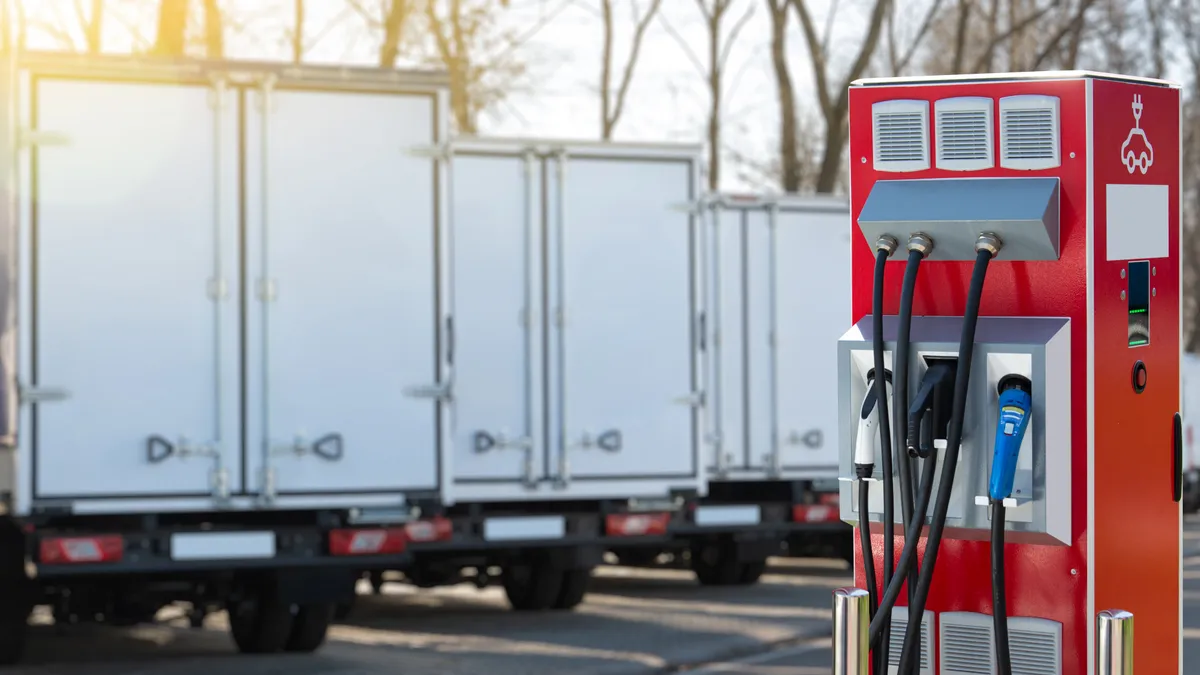Dive Brief:
- Convenience stores, truck stops and other retailers are sounding the alarm on certain electric vehicle charging policies they say will stymie investment in a network of charging stations, just as the federal government prepares to provide billions in incentives for a national rollout.
- In particular, demand charges and the ability of regulated utilities to own charging facilities in some states will keep private investment sidelined, according to Doug Kantor, general counsel of the National Association of Convenience Stores.
- The Biden administration’s National Electric Vehicle Infrastructure, or NEVI, formula program is preparing to disburse $5 billion to states to support the installation of 500,000 charging stations — but experts say greater levels of private investment are needed to assuage concerns over range anxiety.
Dive Insight:
In order to access NEVI funds, states must file EV charging network plans by Aug. 1 with the U.S. Department of Energy and Department of Transportation. Those plans will then be approved on a rolling basis, according to a formula.
Texas could receive up to $408 million over five years; California could see more than $380 million; Florida could receive $198 million; and New York could see $175 million, according to the Charge Ahead Partnership, or CAP, which describes itself as a coalition of businesses, organizations and individuals supporting the development of a national EV network.
Some states have already published plans. Ohio has set a goal for 90% of the state’s residents to live within 25 miles of an EV charger. Wyoming and Nebraska have also published draft plans.
CAP on Tuesday hosted a call with media to highlight concerns businesses have regarding their ability to install charging equipment and turn a profit.
“Congress wants to use this money to leverage additional private capital and investment in EV charging,” CAP Executive Director Jay Smith said. “It's really just meant to jumpstart this market and help it grow.”
Some of that investment will need to be made at retail locations, like gas stations, but those businesses are unsure they can turn a profit with current EV policies, said Kantor. Businesses represented by the National Association of Convenience Stores sell about 80% of all the traditional motor fuels today, he said, and they “see selling electricity to EV drivers as a huge part of the future.”
The only way for the NEVI program to be effective is if those funds incentivize private investment, said Kantor. “There is no way to build out the infrastructure that's needed to charge vehicles without private investment. To just do it with public money, that's not going to happen,” he said.
Kantor and other business representatives on the call say state regulators must address two key issues in order for private businesses to install chargers en masse: Demand charges associated with peak demand should be reduced or eliminated, and utilities operating EV chargers must compete fairly with private businesses.
“Retailers have no confidence that EV charging is a money-making business, even with this federal help,” said Raina Shoemaker, the general operations manager at Shoemaker's Travel Center in Nevada. “I'm terrified of getting hit with the demand charge.”
Demand charges have been a known impediment to EV charging stations for some time. Rocky Mountain Institute released a study in 2017 showing demand charges could be responsible for over 90% of a charging station’s electricity costs. Since then, some states have experimented with demand charge “holidays,” or have dramatically reduced the demand charges for stations.
Another issue is utility ownership of the stations, in particular when it is subsidized by ratepayer funds. Georgia Power has a network of more than 50 chargers, Smith noted.
“There's plenty of money to be made by retailers and the power companies when more people are driving EVs,” Smith said. “It's really going to take a partnership between the two, and not one cannibalizing the other, to make this successful.”
Utilities say their investment is necessary to install chargers in areas where private companies might not be able to turn a profit while EV adoption is nascent.
Georgia Power currently owns and operates 59 public charging stations in the state – but that is only about 3% of the state’s chargers, utility spokesman John Kraft said in an email.
“We believe utilities are uniquely positioned (while the market is in its infancy) to help grow charging infrastructure – especially in underserved areas and charging deserts, which is a position that even convenience store representatives have recognized,” Kraft said.
Retailers are prepared to compete, but they need a level playing field, said Kantor. If regulators allow utilities to build chargers with ratepayer funds, “that’s not a market system,” he said.
Installing a fast charger is a large expense, Kantor said. Retailers “have to recover all that expense but the utility does not because it's been underwritten by all their other customers who are contributing. That distortion of the market is a problem, and a problem for private investment.”












